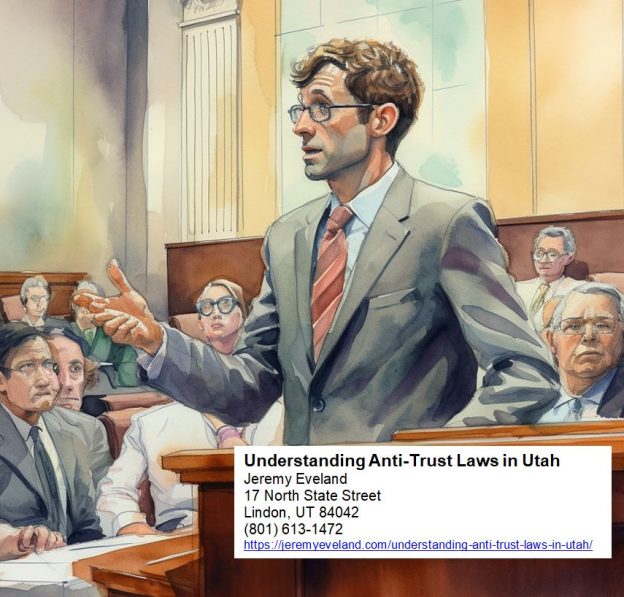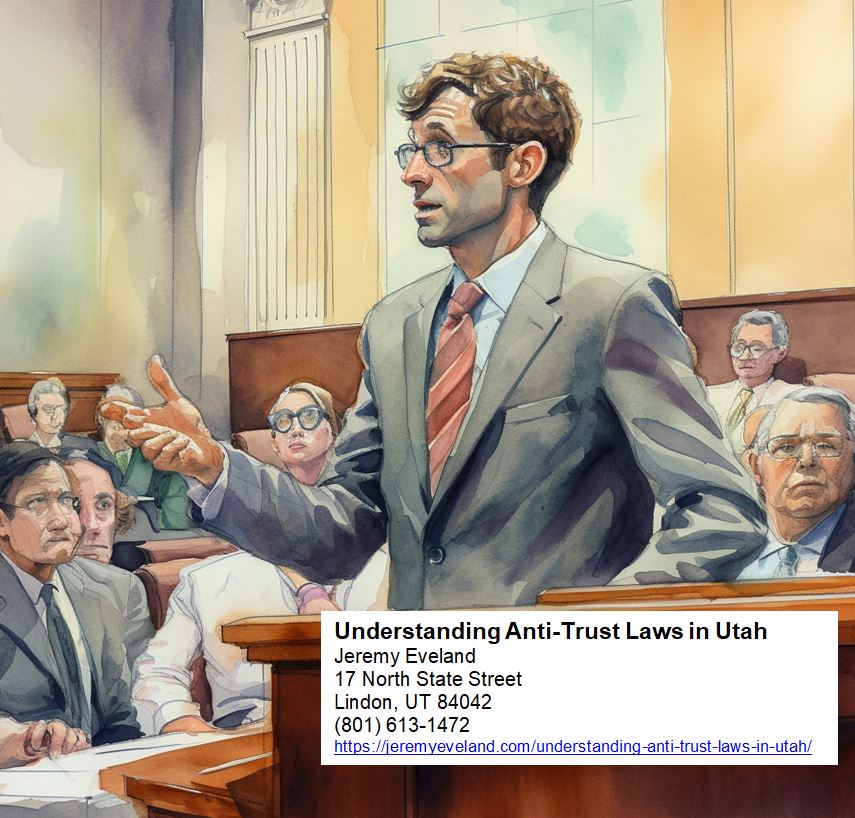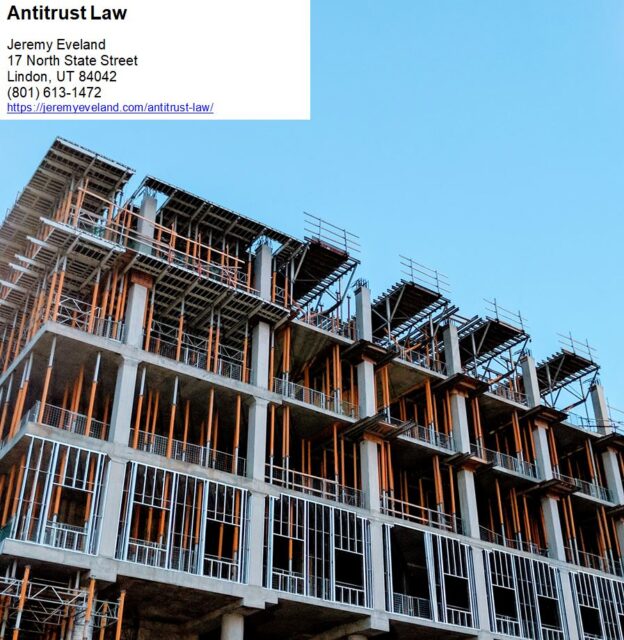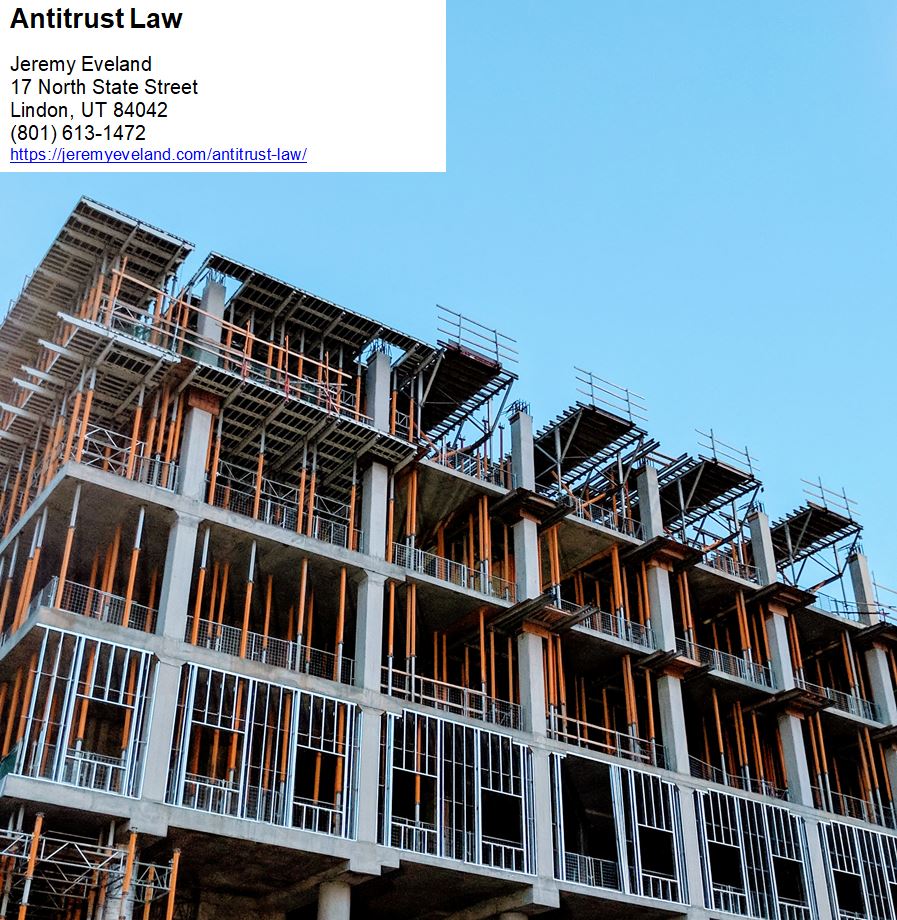Unpacking The Utah Antitrust Laws: Understanding The Legalities Of Competitive Business Practices
Introduction
Antitrust laws, also known as competition laws, are regulations that aim to promote fair competition in the marketplace. These laws prohibit activities that restrict or limit competition, such as monopolies and price-fixing agreements. In Utah, the state legislature has enacted several antitrust laws to protect consumers and promote a competitive market economy.
Definition of Anti-Trust Laws
Antitrust laws are designed to prevent businesses from monopolizing a particular market or industry. They prohibit activities that restrict or limit competition, such as price-fixing agreements, market allocation agreements, and tying arrangements. Price-fixing occurs when competitors agree to set their prices at a certain level rather than compete on price.
Market allocation agreements occur when competitors agree to divide up the market among themselves rather than compete for customers. Tying arrangements occur when a company requires a customer to purchase one product in order to obtain another product.
Importance of Anti-Trust Laws in Utah
The enforcement of antitrust laws is important for maintaining economic freedom in Utah. When companies engage in anti-competitive behavior, it can lead to higher prices for consumers and reduced innovation within industries. By promoting fair competition, antitrust laws encourage businesses to lower costs and improve quality while also providing consumers with more choices.
Additionally, antitrust laws play an important role in maintaining the integrity of the free market economy by preventing companies from gaining too much power over an industry or region. This is especially important in Utah where there are several large corporations operating within various industries.
Purpose of the Outline
The purpose of this outline is to provide readers with an overview of antitrust laws in Utah. It will cover the history and evolution of these laws in Utah along with their key provisions and principles. Readers will also gain insight into enforcement agencies responsible for monitoring compliance with these regulations along with examples of violations and the consequences that follow.
The outline will discuss exemptions and immunities granted under Utah state law along with the future of antitrust enforcement in Utah. By the end of this article, readers should have a comprehensive understanding of antitrust laws in Utah and their significance in promoting economic freedom and fair competition.
Overview of Anti-Trust Laws in Utah
Utah’s antitrust law is a set of legal provisions that seek to promote competition in the marketplace and prevent anti-competitive behaviors. The law prohibits any conduct that restricts trade or commerce, or harms consumers’ interests. By promoting competition, antitrust laws help ensure that businesses have to compete fairly, which can result in lower prices, better quality products and services, innovation, and increased variety.
History and Evolution of Anti-Trust Laws in Utah
Utah’s antitrust law has its roots in federal antitrust laws such as the Sherman Act (1890) and the Clayton Act (1914). These laws were enacted to address concerns about monopolies and anti-competitive practices among businesses.
Utah adopted its own version of these laws with the passage of the Utah Antitrust Act in 1989. The law was later amended in 1995 to include provisions that strengthen it further.
The amendments included expanded definitions of anti-competitive behavior, enhanced enforcement mechanisms, and increased civil penalties for violations. Since then, there have been several other amendments made to the law.
Key Provisions and Principles of Anti-Trust Laws in Utah
The key provisions of Utah’s antitrust law prohibit a wide range of anti-competitive behaviors such as price-fixing agreements between competitors; market allocation agreements where competitors agree not to compete against each other; tying arrangements where companies force customers to buy one product if they want another; monopolization where a company dominates a market; predatory pricing where a company prices its goods below cost with the intent to drive out competitors. The principles underlying these provisions are rooted in economics theories that suggest competition leads to better outcomes for all parties involved. Competition creates additional choices for consumers while also driving innovation by creating incentives for companies to improve their products or services continually.
Enforcement Agencies and Mechanisms for Anti-Trust Laws in Utah
Utah’s antitrust law is enforced by the Utah Antitrust Enforcement Division, which has a broad range of powers to investigate and prosecute anti-competitive behaviors. The Division has the power to initiate investigations, conduct hearings, issue subpoenas for documents and witnesses, and enforce the law’s provisions.
The Division also works closely with other state and federal agencies such as the Federal Trade Commission (FTC) and the Department of Justice (DOJ) to coordinate antitrust enforcement activities. Additionally, private parties who have been injured as a result of anti-competitive behavior can file lawsuits in court seeking damages or injunctive relief.
Types of Anti-Competitive Conducts Prohibited by Utah’s Antitrust Law
Price Fixing: Collusion Among Competitors
Price fixing refers to a situation where two or more competing firms come together and agree on a fixed price for their products or services. The aim of this agreement is to eliminate price competition and increase profits for the participating companies at the expense of consumers.
Utah’s antitrust law prohibits any form of price-fixing, whether it is vertical (between manufacturers and retailers) or horizontal (between competitors). Violation of this provision can lead to both civil and criminal penalties.
In Utah, the enforcement agencies responsible for investigating and prosecuting these violations are the Attorney General’s Office and the Department of Justice. They have prosecuted several cases involving price-fixing activities in various industries such as real estate, healthcare, construction, among others.
Market Allocation Agreements: Dividing Markets Among Competitors
Market allocation agreements refer to situations where two or more competitors agree to divide a particular market among themselves. In other words, they agree not to compete with each other in that specific market but instead focus their efforts on different markets. This type of agreement can be detrimental to consumers since it eliminates competition in certain markets leading to higher prices and reduced choices.
Utah antitrust laws prohibit any form of market allocation agreement between competitors since they violate antitrust principles. The state has successfully prosecuted several cases involving this type of violation across different industries such as healthcare, transportation, technology, among others.
Tying Arrangements: Unfair Bundling Practices
Tying arrangements refer to situations where a company forces consumers to purchase one product or service as a condition for purchasing another product/service from them. This practice is often used by companies with significant market power where they tie less popular products/services with popular ones intending to force consumers to buy them in the process.
Utah’s antitrust law prohibits tying arrangements that are anti-competitive and violate antitrust principles. The state has successfully prosecuted several cases involving this violation across various industries such as technology, healthcare, telecommunications, among others.
Monopolization: Abusing Market Power
Monopolization refers to situations where a company has significant market power and uses it to restrict competition in the market by excluding competitors or preventing new ones from entering. This practice is harmful to consumers since it eliminates competition leading to higher prices and reduced choices. Utah’s antitrust laws prohibit monopolization practices that harm competition and violate antitrust principles.
Violations of this provision can lead to both civil and criminal penalties, including fines, injunctions, and even imprisonment for individuals involved in the violation. The state has successfully prosecuted several cases involving monopolization across different industries such as energy, healthcare, technology, among others. Case Studies on Violations of Antitrust Law in Utah
Antitrust laws are meant to protect consumers by promoting competition in the market. When companies engage in anti-competitive behaviors, they violate antitrust law and are subject to penalties and fines. In Utah, there have been several instances of companies violating antitrust laws, leading to legal action against them. The Questar Gas Case: An Example of Price Fixing
In 2016, Questar Gas was accused of violating antitrust laws by engaging in price-fixing activities. The company was accused of manipulating natural gas prices for its customers by increasing gas prices during peak demand periods without any justification. This led to increased customer bills, which ultimately hurt consumers’ wallets.
After an extensive investigation by the Utah Attorney General’s Office, Questar Gas agreed to pay $2 million as a settlement for violating antitrust laws in Utah. The company also agreed to maintain transparent business practices and submit regular reports showing compliance with state regulations. The Salt Lake City Taxi Cab Case: An Example of Market Allocation Agreements
In 2012, the Salt Lake City Taxi Cab Association was sued for engaging in market allocation agreements that violated antitrust laws. The association had made an agreement with other taxi operators that they would not compete with each other outside their designated markets or territories.
This anti-competitive behavior led to higher fares and poorer service for customers since there were no incentives for taxi operators to provide better services or reduce fares. After a legal battle that lasted several years, the Salt Lake City Taxi Cab Association was ordered by a federal court judge to stop engaging in market allocation agreements and pay $700,000 as fines. The Rocky Mountain Power Case: An Example of Monopolization
In 2018, Rocky Mountain Power was accused of monopolizing the energy transmission industry in Utah by restricting access to transmission lines that are vital to the operation of renewable energy projects. The company was accused of using its dominant market position to prevent other companies from entering the market and competing with them.
This anti-competitive behavior disrupted the development of renewable energy projects in Utah, leading to increased costs for consumers and a lack of diversity in Utah’s energy sources. After several months of investigation, Rocky Mountain Power agreed to open up access to their transmission lines for renewable energy projects and pay $10 million as penalties for violating antitrust laws in Utah.
These case studies illustrate why antitrust laws are important in promoting competition and protecting consumers from anti-competitive business practices. Violating these laws can be very costly for companies, leading to hefty fines, legal battles, and reputational damage that can harm their businesses’ long-term prospects.
Consequences for Violating Antitrust Law in Utah
Criminal Penalties: The Severity of Criminal Penalties for Antitrust Violations in Utah
Antitrust law violations can result in both criminal and civil penalties, depending on the type and severity of the offense. In Utah, a violation of antitrust law can lead to criminal charges, including fines and imprisonment.
Individuals or companies found guilty of violating antitrust laws may face imprisonment for up to ten years per violation. Additionally, violators may also be fined up to $100 million per violation.
The severity of these penalties highlights the importance of compliance with antitrust laws and regulations in Utah. Companies should take proactive measures to ensure they are not engaged in anti-competitive conduct such as price-fixing, bid-rigging or monopolistic behavior that may result in criminal prosecution.
Civil Penalties: The Ramifications and Implications of Civil Penalties for Antitrust Violations In Utah
In addition to criminal penalties, a company or individual that violates anti-trust laws may also be subject to civil fines. The Federal Trade Commission (FTC) or Department of Justice (DOJ) may file civil lawsuits against companies found guilty of engaging in anti-competitive conduct.
Civil fines can have serious financial implications as violators can be fined up to three times the amount of damages caused by their actions or up to 10% of their annual revenue during the period that they were engaging in anti-competitive conduct. These hefty fines serve as both punitive measures and deterrents against similar violations by other entities.
Injunctions: Repercussions That Come with an Injunction Against an Entity Engaging In Anti-Competitive Conduct
Another consequence faced by companies violating antitrust laws is injunctions imposed either temporarily or permanently against them from engaging in similar activities that violate the law. Injunctions are court orders that prohibit companies from continuing with anti-competitive behavior or practices that violate anti-trust laws.
Injunctions can be temporary or permanent and may prevent companies from engaging in specific activities, requiring them to undergo compliance programs, divest assets or alter their corporate structures to ensure they comply with antitrust regulations. Additionally, injunctions may require companies to pay restitution to consumers who suffered harm due to their anticompetitive conducts.
Therefore, it is important for business entities in Utah to understand the consequences of violating antitrust laws and engage in ethical business practices that do not violate any rules and regulations. Violation of these laws can lead to both criminal and civil penalties as well as injunctions with far-reaching financial implications on an organization’s bottom line.
Anti-trust Exemptions and Immunities Under State Law
State Action Doctrine
The State Action Doctrine is an exemption that shields state governments from federal antitrust laws. Under this doctrine, a state’s regulatory actions that harm competition are immune from antitrust scrutiny if the action is actively supervised by the state. The idea behind the doctrine is to recognize and preserve the role of states as sovereign actors and promote their regulatory authority.
However, this exemption does not mean that all activities undertaken by a state are automatically immune from antitrust enforcement. For example, if a state imposes price-fixing regulations on milk producers without active supervision, it may run afoul of federal antitrust laws.
In Utah, the State Action Doctrine has been applied in cases involving local government entities like municipalities. In Salt Lake City Taxi Cab Association v. Salt Lake City Corp., the court held that Salt Lake City’s regulation of taxi cab prices was immune from federal antitrust law because it was actively supervised by the city government.
Noerr-Pennington Doctrine
The Noerr-Pennington Doctrine is another exemption under which individuals and groups can engage in lobbying or other petitioning activities without violating antitrust laws. This doctrine recognizes that free speech rights under the First Amendment would be threatened if individuals or groups were subject to antitrust liability for engaging in legitimate petitioning activities. This doctrine applies when parties engage in petitioning activity aimed at influencing government action or policy-making decisions rather than directly competing with one another in a particular market.
For example, if two companies engage in lobbying efforts aimed at changing a law that affects their respective industries, they are protected under this doctrine. In Utah, this exemption was recognized by the court in Questar Gas Co v. Town of Garden City where Questar Gas was exempted from federal antitrust law under Noerr-Pennington Doctrine for engaging in lobbying efforts to secure a franchise agreement with the local government.
Conclusion: The Future of Antitrust Enforcement In Utah
Antitrust laws play a crucial role in ensuring that market competition remains fair and open. As technology continues to evolve and markets become more complex, antitrust enforcement will face new challenges.
In Utah, the state’s antitrust laws have been successful in promoting competition and protecting consumers from anti-competitive practices. However, as seen in recent cases involving the tech industry, new approaches may be needed to address emerging issues.
Going forward, it is likely that Utah’s antitrust enforcement agencies will continue to prioritize investigations into anti-competitive conduct that harms consumers and businesses. At the same time, there may be a need for greater coordination with federal agencies to address cross-jurisdictional issues.
Overall, Utah’s commitment to antitrust enforcement is an important tool for promoting economic growth and protecting consumer welfare. As the landscape of competition changes over time, it will be crucial for regulators and policymakers to remain vigilant in preserving a level playing field for all market participants.
Conclusion: The Future of Antitrust Enforcement In Utah
The Potential for Enhanced Antitrust Enforcement
The future of antitrust enforcement in Utah is promising, given the increasing attention and resources being devoted to these issues. In recent years, there has been a growing recognition among policymakers and the public of the need to address anticompetitive behavior more aggressively. This trend has been reflected in recent legislative initiatives aimed at strengthening state antitrust laws, as well as in the increased activity of enforcement agencies at both the state and federal levels.
One factor that is likely to contribute to enhanced antitrust enforcement is the increasing sophistication of technology and data analytics tools that enable regulators to identify and investigate potential violations more efficiently. As these tools continue to evolve, it is expected that regulators will become better equipped to detect and prosecute anticompetitive conduct across a broader range of industries.
The Importance of Collaboration Between State and Federal Regulators
Another key factor that will shape the future of antitrust enforcement in Utah is the extent to which state regulators are able to collaborate effectively with their federal counterparts. Given that many cases involving anticompetitive behavior have interstate implications, it is critical that state agencies work closely with federal authorities such as the Department of Justice (DOJ) or Federal Trade Commission (FTC) on investigations. To this end, there have been efforts in recent years by both state regulators and federal agencies to enhance coordination and information sharing around issues related to antitrust enforcement.
For example, Utah’s Attorney General Sean Reyes has participated in several multi-state investigations into alleged violations by large corporations such as Google or Facebook. These types of collaborations are expected to continue going forward.
The Need for Public Education on Antitrust Issues
It is important for policymakers and regulatory bodies alike to recognize the critical role that public education can play in promoting effective antitrust enforcement. Many consumers may not be aware of the various types of anticompetitive behavior that are prohibited by law, or how to report potential violations to the appropriate authorities.
To address this gap, there may be a need for greater investment in public education campaigns focused on antitrust issues, which could help raise awareness, promote transparency, and build trust between regulators and the public. Such campaigns could be targeted at specific industries or communities where there is evidence of significant market power imbalances.
The future of antitrust enforcement in Utah looks promising, with increasing attention and resources being devoted to these issues at both the state and federal levels. However, effective enforcement will depend on a range of factors including technological advancements, collaboration between regulatory bodies, and public education around antitrust issues.
Areas We Serve
We serve individuals and businesses in the following locations:
Salt Lake City Utah
West Valley City Utah
Provo Utah
West Jordan Utah
Orem Utah
Sandy Utah
Ogden Utah
St. George Utah
Layton Utah
South Jordan Utah
Lehi Utah
Millcreek Utah
Taylorsville Utah
Logan Utah
Murray Utah
Draper Utah
Bountiful Utah
Riverton Utah
Herriman Utah
Spanish Fork Utah
Roy Utah
Pleasant Grove Utah
Kearns Utah
Tooele Utah
Cottonwood Heights Utah
Midvale Utah
Springville Utah
Eagle Mountain Utah
Cedar City Utah
Kaysville Utah
Clearfield Utah
Holladay Utah
American Fork Utah
Syracuse Utah
Saratoga Springs Utah
Magna Utah
Washington Utah
South Salt Lake Utah
Farmington Utah
Clinton Utah
North Salt Lake Utah
Payson Utah
North Ogden Utah
Brigham City Utah
Highland Utah
Centerville Utah
Hurricane Utah
South Ogden Utah
Heber Utah
West Haven Utah
Bluffdale Utah
Santaquin Utah
Smithfield Utah
Woods Cross Utah
Grantsville Utah
Lindon Utah
North Logan Utah
West Point Utah
Vernal Utah
Alpine Utah
Cedar Hills Utah
Pleasant View Utah
Mapleton Utah
Stansbury Par Utah
Washington Terrace Utah
Riverdale Utah
Hooper Utah
Tremonton Utah
Ivins Utah
Park City Utah
Price Utah
Hyrum Utah
Summit Park Utah
Salem Utah
Richfield Utah
Santa Clara Utah
Providence Utah
South Weber Utah
Vineyard Utah
Ephraim Utah
Roosevelt Utah
Farr West Utah
Plain City Utah
Nibley Utah
Enoch Utah
Harrisville Utah
Snyderville Utah
Fruit Heights Utah
Nephi Utah
White City Utah
West Bountiful Utah
Sunset Utah
Moab Utah
Midway Utah
Perry Utah
Kanab Utah
Hyde Park Utah
Silver Summit Utah
La Verkin Utah
Morgan Utah
Understanding Anti-Trust Laws in Utah Consultation
When you need help with Understanding Anti-Trust Laws in Utah, call Jeremy D. Eveland, MBA, JD (801) 613-1472 for a consultation.
Jeremy Eveland
17 North State Street
Lindon UT 84042
(801) 613-1472
Related Posts
Business Lawyer Millcreek Utah
Business Lawyer Taylorsville Utah
How Artificial Intelligence is Shaping the Future of Business Law
Estate Planning is Crucial for People of All Income Levels
Navigating Legal Challenges in Business Succession Planning
Business Lawyer Bountiful Utah
How To Structure A Merger Or Acquisition In Utah
How To Hire Employees Legally in Utah
10 Tips for Negotiating Lease Agreements
Business Lawyer Spanish Fork Utah
How To Start A Non-Profit In Utah
What are the Trademark Laws in Utah
Business Lawyer Pleasant Grove Utah
How to Calculate Overtime Pay in Utah
Business Lawyer Cottonwood Heights Utah
Understanding Utah’s Consumer Protection Laws
Comprehensive Guide To Hiring A Business Lawyer
Business Lawyer Springville Utah
Mergers and Acquisitions from a Legal Perspective





